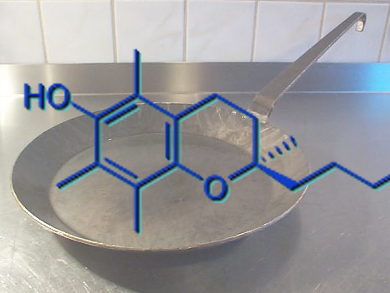Tocopherols are food components that have the biological activity of vitamin E. It is the main lipophilic antioxidant and plays a crucial role in various physiological functions, e.g., in cardiovascular disease prevention. During production, refining and storage of vegetable oils substantial tocopherol losses are caused by oxidation processes. However, the loss of tocopherols during culinary processing at home, such as baking, frying, and other heat treatments, had not been quantified up to now.
Jakub Fisnar and colleagues, Institute of Chemical Technology, Prague, Czech Republic, analyzed the loss of tocopherol in vegetable oils heated in a pan and correlated the loss of tocopherols to the formation of polymerized triacylglycerols (pTAGs) as an indicator for the chemical changes taking place during heating. Moderate heating of the oil to 180 °C for only 12 minutes results in a slight increase in pTAGs but already causes a tocopherol loss of almost 100 %.
Considering that in common practice frying temperatures up to 250 °C are routinely used, complete depletion of tocopherols is likely. In order to minimize vitamin E loss, it is best to keep the preheating time to a minimum and ad the food promptly after reaching a temperature of 180 °C.
- Tocopherol losses during pan-frying,
Jakub Fišnar, Marek Doležal, Zuzana Réblová,
Eur. J. Lipid Sci. Technol. 2014.
DOI: 10.1002/ejlt.201400188




